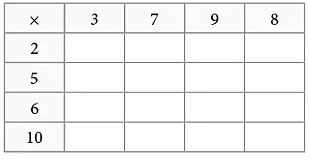Class 2 Maths Multiplication - CBSE Worksheets- 1
 Q1: Complete the Following
Q1: Complete the Following
(i) 
(ii) 
(iii) 
Q2: Fill in the blanks, using properties of multiplication
(i) 2 × 5 = 5 × 2 = ______.
(ii) 5 × 7 = 7 × 5 = ______.
(iii) ______ × ______ = 1 × 8 = ______.
(iv) 0 × 9 = ______ × ______ = ______.
Q3: Write each product.
(i) 3 × 3 =
(ii) 5 × 4 =
(iii) 9 × 8 =
(iv) 5 × 2 =
(v) 8 × 10 =
(vi) 7 × 6 =
Q4: Compare the following using >, < or =.
(i) 7 added 9 times ______ 10 added 5 times.
(ii) 7 × 5 ______ 6 × 6
(iii) 5 × 3 ______ 15
Q5: There are 7 coins in each stack. There are 8 stacks of coins. How many coins are there in all?
Q6: Complete the multiplication grid. Q7: Which of the following is different?
Q7: Which of the following is different?
(a) 4 + 4 + 4 + 4 + 4 + 4
(b) 4 times 6
(c) 6 fours
(d) 6 times 4
Q8: 6 cars with 5 people each. How many people are there in all?
Q9: ______ × 5 = ______ × ______ = 30
Q10: 8 + 8 + 8 + 8 + 8 + 8 = ______.
You can access the solutions to this worksheet here.
|
1 videos|494 docs
|
FAQs on Class 2 Maths Multiplication - CBSE Worksheets- 1
| 1. What is the concept of grouping in multiplication? |  |
| 2. How can sharing relate to multiplication? |  |
| 3. What are some practical examples of grouping and sharing in everyday life? |  |
| 4. How does understanding grouping and sharing help in solving multiplication problems? |  |
| 5. What strategies can I use to teach grouping and sharing in multiplication to children? |  |
















